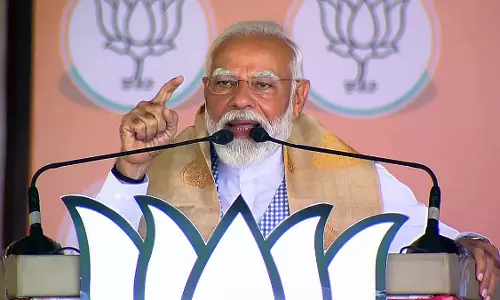
Human rights of Kashmiris
text_fieldsThe step of withdrawing through a Presidential order the provisions that grant special privileges to Jammu-Kashmir under Article 370 of Indian constitution, was a watershed event in India's history. When Kashmir was already a military barrack, another 50,000 troops were deployed in that context.
The move to 'solve' the Kashmir issue once and for all by the Narendra Modi-combine was made after closing every outlet for expressing voices of dissent, by freezing all the political parties in the state except BJP and putting in detentioon their political leaders. But, as it happened in the case of measures impinging on people's lives suh as the note-ban and swift rolling out GST, the dramatic act of converting Kashmir overnight into a centrally-administered territory, did not trigger any reactions in the country worth the name. Not only that, most of the people were showing relief that a permanent headache has been somehow eliminated. The sad fact is that even when 7.5 million Kashmiris were denied means of communication, schools and colleges were closed, the entire market was shut, the people were not able to come out of their homes and they were pushed to conditions worse than prison, none of this caused any reverberations in the rest of the country. Even when the parliament was convened, the fact that members from Kashmir were denied the opportunity to attend the session, was not made an issue. When the Centre refused permission for CPM General Secretasry Sitaram Yechury to see his party colleague Mohammed Yousuf Tarigami, and subsequently for other party leaders to enter Kashmir, there came a situation when the Supreme Court had to intervene to grant conditional permission. When criticisms were raised at international level, both under Pakistani propaganda and otherwise, the government got into face-saving strategy like facilitating a visit by a 'select' group of European Union leaders under government escort and control, and similar quick-fix methods.
In the meantime, Anuradha Bhasin, editor of Kashmir Times and Congress's Rajya Sabha member Ghulam Nabi Azad, filed petitions in the Supreme Court against the communications ban continuing in Kashmir which came before a three-judge bench consisting of Justice Subhash Reddy, NV Ramana and Justice BR Gavai. The bench issued a crucial judgement the other day. With a prologue that the bench would try its best to achieve a balance between human rights and security concerns in Kashmir - whose history was 'etched with violence and militancy' - the three-member bench made some major observations.
- The medium of internet comes within the ambit of the right to freedom of expression guaranteed in Article 19(1) of the Constitution. The duration of 150 days is the longest reported in a democracy with internet curbsd. The internet clampdown adversely affects the right to trade, guaranteed by the Constitution. Therefore, the internet block should be revisited within a week. Internet cannot be suspended indefinitely. Therefore, within a week restrictions should be reviewed; the facility cannot not be suspended indefinitely.
- The prohibitory order under CrPC Section 144, should be exercised only when there exists a danger. While doing so, the magistrate should maintain a balance between the rights of the individual and the concerns of the state.
Although about ten petitions challenging the constitutional validity of the abrogation of special privileges of Jammu-Kashmir were before the apex court, the bench did not take them up for the time being. The court has only ordered the review of internet curtailment – that brought people's life to a standstill – within a week, and that if it is essential to continue them they should be reviewed from time to time. The spirit of the judgement is that there should be a check on repeated issue of prohibitory orders in certain areas and that there should not be any misuse of authority. But the response of Modi government – given to justifying all curbs and restrictions on the pretext of national security – remains to be seen. And the judgment does provide enough loopholes for that. Given that the stance of home minister Amit Shah against all kinds of civil and human rights is evident from past experience, there appears to be little chance for the court's judgement to be implemented as such. He may already have instructions to set up a situation to continue denial of human rights citing border violations from a neighbouring country or extremist acts. Whatever the government's actions, with the almost certain support and co-operation of media, the court order by itself need not make make people's life in Kashmir normal. Only from governments with respect for commitment to constitutional principles will it be in place to expect compliance with the court judgment.























